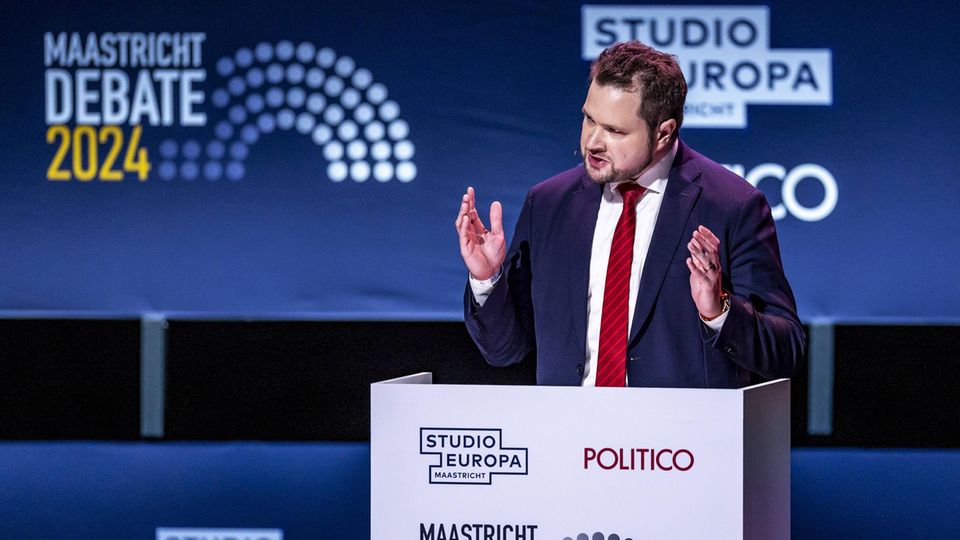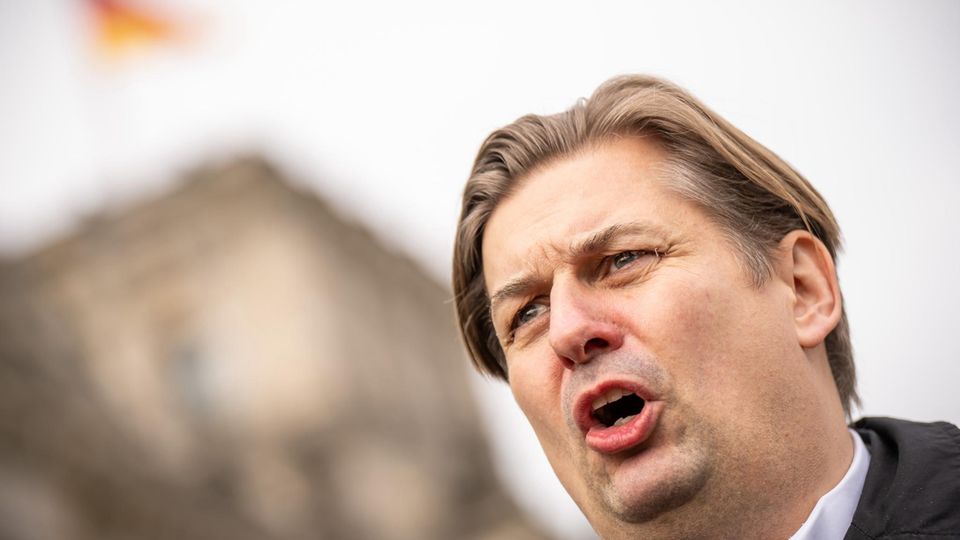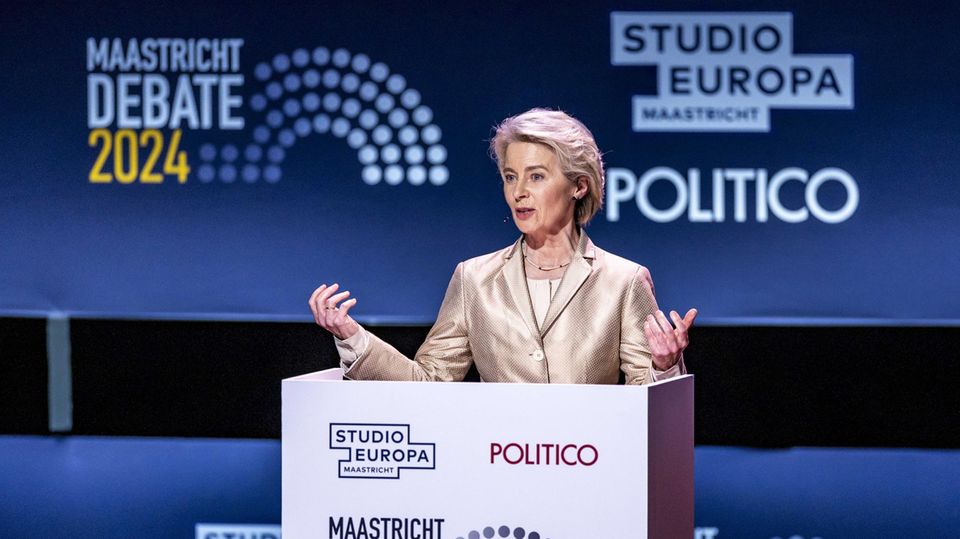There are just under five weeks left for the European elections. The leading candidates of the European parties met in Maastricht for the first debate. Six lessons from the debate.
It was about the wars in the Gaza Strip and Ukraine, Hamas, migration, climate protection and artificial intelligence: On Monday, the top candidates for the European elections, which will take place in the 27 member states from June 6th to 9th, met in Maastricht first debate organized by “Politico Europe” and “Studio Europa”.
Included were:
- Ursula von der Leyen (European People’s Party)
- Nicolas Schmit (Party of European Socialists)
- Marie-Agnes Strack-Zimmermann (Alliance of Liberals and Democrats for Europe)
- Bas Eickhout (European Green Party)
- Anders Vistisen (Identity and Democracy Party)
- Walter Baier (Party of the European Left)
- Maylis Roßberg (Free European Alliance)
- Valeriu Ghilețchi (European Christian Political Movement)
All eight are candidates for the post of chairman of the European Commission. Von der Leyen currently holds the office.
For an hour and a half, the politicians discussed the biggest issues in the European elections on stage – and also argued passionately. These are the six most important conclusions from the debate:
Everyone is bashing the extreme right
The top candidates did not agree on many things. But when it came to the Identity and Democracy (ID) party, it was – especially when it came to foreign and security policy. Vistisen accused the established parties of exploiting Russia’s war of aggression against Ukraine to change EU treaties and abolish the veto right. Bas Eickhout from the Greens countered that the Danish right-wing populist should remember that Russia and China also influence the extreme right in the European Parliament. “Maybe you’ll clean up your own house before you play teacher!” Thunderous applause from the hall for this statement.
Von der Leyen also attacked the right-wing populist. She said that the AfD Europe’s leading candidate Maximilian Krah and the AfD Bundestag member Petr Bystron are connected to Russia. “If you look at the election program (of the AfD, member party of the ID), you will see that it reflects the Kremlin’s lies and propaganda. So clean up yourselves before you criticize us!” Vistisen tried to talk his way out of it, which was met with boos from the audience.
Von der Leyen open to working with right-wing conservatives
She distances herself from the extreme right-wing ID, but the CDU politician could certainly imagine cooperating with the European Conservatives and Reformers (ECR) group. “It depends very much on how parliament is composed and who sits in which faction,” said von der Leyen. For example, the EKR includes the party of the far-right French politician Eric Zemmour and the far-right Spanish party Vox. The ultra-right party of Italian Prime Minister Giorgia Meloni, the Fratelli d’Italia, as well as the national-conservative Polish former government party PiS also belong to this faction.
However, Von der Leyen made it clear that she would not work with “Putin’s deputies”. They tried to “destroy” the EU from within through disinformation and polarization.
The public does not want von der Leyen as Commission President
The major representative polls point to a victory for the EVP, the Von der Leyen party. But if you ask the audience who should become President of the EU Commission, the former defense minister is relegated to second place. In a live poll on Monday evening, which was shown before the debate started, von der Leyen received around a quarter of the votes from the audience. A third wanted the Green Bas Eickhout as EU Commission President. The FDP politician Marie-Agnes Strack-Zimmermann came in third place. Not much changed after the debate: Eickhout was even able to catch up to around 45 percent, von der Leyen to more than 30 percent. Strack-Zimmermann ended up in fifth place with just four percent; Left Baier took third place at the start. However: It was not a representative survey.
Europe’s conflicts
No peace: these wars raged on the European continent after the Second World War
When it comes to climate, everyone wants to go (more or less) in the same direction – but in different ways
The EU wants to be climate neutral by 2050. Von der Leyen presented the Green Deal in 2019 and is now defending it. “The European Green Deal is the solution for the competitiveness of the European economy,” she said. If you want to reduce energy prices, you have to invest in renewable energies. The plan is there, you just have to implement it. Eickhout made similar comments, calling for more investment. Several of the candidates, including Strack-Zimmermann, Eickhout and von der Leyen, also emphasized the importance of agriculture as a player in climate protection.

Aggressive: Anders Vistisen
© Marcel van Hoorn / ANP / Imago Images
Walter Baier from the Left wants the EU to become climate neutral even faster – and for this to make the rich pay more. “One percent of the population is responsible for 50 percent of the pollution,” he criticized. This one percent must be held responsible. “Tax the rich!” is his mantra. The Social Democrat Schmit warned that the climate and its change “do not take a break”. More investment must be made in new technologies and a socially just climate policy. ID politician Vistisen wants there to be more innovations and market-driven models, not subsidies. Christian Democrat Valeriu Ghilețchi said that we have to be careful with climate policy because it also has consequences for people.
When it comes to the topic of war, the candidates are divided
One wonders which war is more important to the top candidates. The European left wants Moscow and Kiev to start peace negotiations. One of the two moderators wanted to know from Baier whether Ukraine should cede territory to Russia. Although he condemned the Russian war, he called for a “political solution” and not a military one. Then he quickly switched to the war in Gaza. “When are you going to sanction Israel?” he asked von der Leyen, which drew a lot of applause. He once again avoided the moderator’s follow-up questions. Von der Leyen was initially undeterred. “I’m tired of hearing this. If you want to end this war, Putin just has to stop fighting. Then the war will be over!” That was also applauded.

Krah is not taking part in the start of the election campaign, but emphasizes: “I am and will remain the top candidate”
01:41 minutes
Another change of war, von der Leyen emphasizes Israel’s right to self-defense. At the same time, she called for a ceasefire, the release of the Israeli hostages and help for the people of Gaza. A record that has been playing for a while. Eickhout therefore wanted to know whether an Israeli invasion of Rafah was a red line. “I never draw red lines, but I think it would be completely unacceptable if Netanyahu invaded Rafah,” was the EPP candidate’s response. When asked what that meant, von der Leyen snapped: “Then we’ll sit down with the member states and act accordingly.”
When the Dane Vistisen directed the debate to the growing anti-Semitism as a result of the war in the Middle East, Baier intervened again. It is “ridiculous” that a politician from the extreme right would campaign against anti-Semitism – and then again criticize Israel for its actions in the Gaza Strip. By then it was no longer about Ukraine. Instead, everyone passed the buck to each other.
Von der Leyen and Eickhout strong, Vistisen makes a fool of himself, the rest: snore
After 90 minutes, the current Commission President and her Green opponent emerged as the winners of the debate. Von der Leyen was convincing, appeared eloquent, confident and serious, and in some moments even biting. It was a similar story for Eickhout, who received a lot of applause from the audience. The Identity and Democracy party’s candidate, Vistisen, was aggressive but also seemed awkward, clumsy and cornered. He often reacted when he was criticized and tried to defend himself with sometimes crude statements and references to his home country Denmark.
The other candidates, including Marie-Agnes Strack-Zimmermann, were pale in the debate. The FDP politician in particular seemed rather stiff and not as articulate and rowdy as we usually know her to be. The statements of the remaining candidates were also expected and as recited from the party program. That wasn’t convincing.
Sources: news agencies AFP and DPA, Maastricht Debate 2024, “Politico”, Euronews


